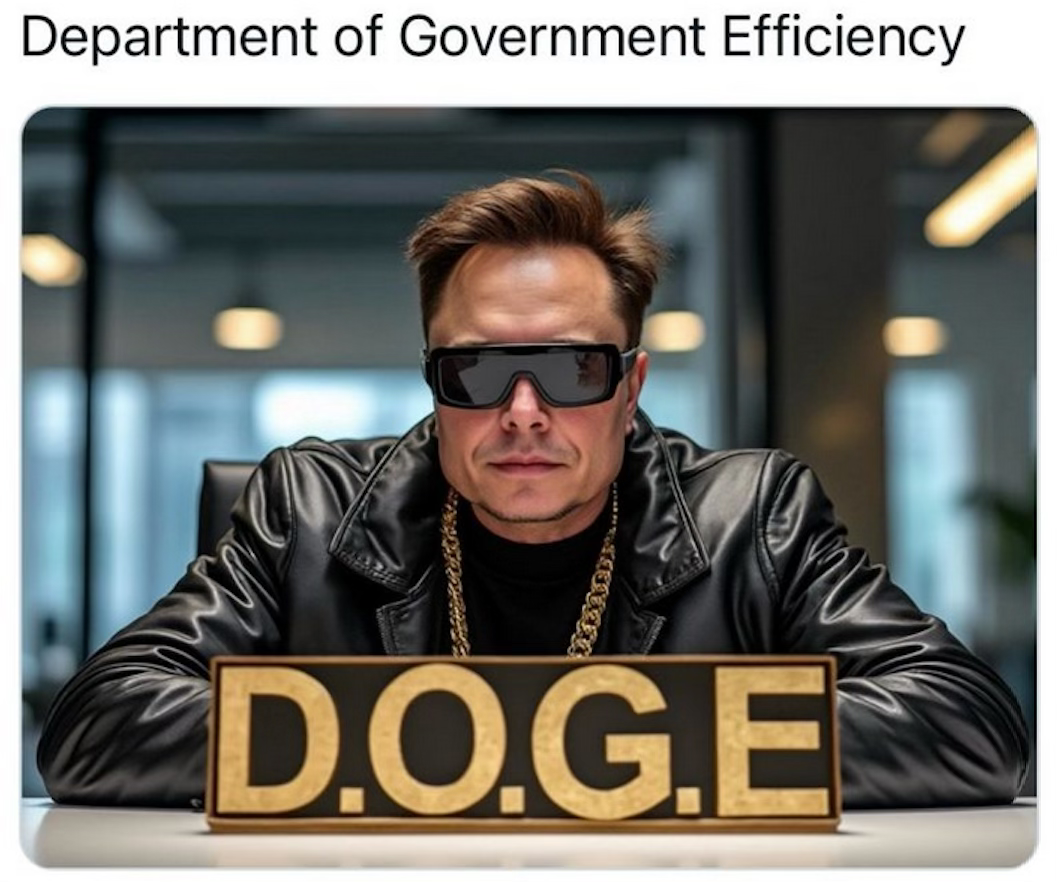“We Will Coup Whoever we Want. Deal with It”
Team Trump and Elon Musk's New Role @ DOGE, SpaceX Starlink. An appraisal of technology for geopolitical control. A wolf in sheep’s clothing.
Featured contributor Prof. Josef Mahoney was interviewed by Abhishek G Bhaya with #trt World on Elon Musk joining the Trump Administration:
Josef Gregory Mahoney, a professor of politics and international relations at Shanghai-based East China Normal University, tells TRT World that China may not take Elon's new "official" role seriously.
"Simply participating in this type of government initiative doesn't really mean that he's a government official... say on par with the national security advisor or the secretary of state," he reasoned.
"Given that Musk once backed the failed cryptocurrency 'dogecoin, I'm not sure how seriously we can take a task force named DOGE."
Mahoney [believes] Musk's influence will be limited when it comes to foreign policy. "Musk might be a backchannel for dialogue, but his sway over US policy will likely be limited."
Mahoney believes that China will nevertheless keep a close eye on Musk, whose track record has often been unpredictable. He points to Musk's abrupt departure from White House advisory groups in 2017 over disagreements with Trump on climate policy and immigration, only to later reconcile with him before the 2024 elections.
https://www.linkedin.com/in/josef-gregory-mahoney-95481615/
"It's difficult to know precisely how Musk might act," he says. ###
Additionally: some analyses hold that Tesla is failing to compete with Chinese EVs and we shouldn't be surprised if Musk decides to focus on SpaceX and his new Al firm and effectively abandon #china. He was an "Al doomer" who pressured the Chinese leadership on this point according to several sources. So what's his real agenda going forward, we can't be sure, but my sense is this DOGE thing is a joke.
An appraisal of technology for geopolitical control
A wolf in sheep’s clothing. SpaceX Starlink
11th November 2024 “We Will Coup Whoever we Want. Deal with It”
By kutniti.org
CHAPTER I: THE WORLD WE LIVE IN
1. India’s need for sovereignty and technical independence has been artificially held back in the past and present. Is Starlink the latest tool brought upon by U.S.A. to impede India’s New Space, Defense & intelligence, and telecom capabilities?
2. With sanctions and restrictions imposed by the U.S.A. every decade, Indian scientific & engineering programs face abnormal hurdles; we ultimately achieve great outcomes despite this forced adversity:
A. B. C. D. E. F. India’s nuclear program: despite Homi Bhabha’s assassination, we went on Operation Shakti and became a nuclear deterrent state. [1]
Rocket engines: despite the cohesive move against India’s program, we went on to build one of the most successful Space Programs in the world. [2]
Fighter Jet: sanctions spread across 3 decades have not been able to hold back the development of the Tejas. [3]
GPS: denial of GPS in the Kargil war to the Indian Forces by the U.S.A., created a reason for U.S.A. to build the NaVIC constellation. [4]
Missiles: MTCR (lead by U.S.A.) restricted development of Indian missiles, ultimately leading to indigenous missiles that are now class leading globally, including Agni. [5]
In more recent years, in 2019, India has another mission also called Shakti, testing an anti-satellite (ASAT) missile. Becoming the 4th nation after U.S.A., Russia & China to test them live and destroy a sat. The USA was strongly against the test. "NASA Administrator Jim Bridenstine touched on testing that creates space debris in a U.S. House of Representatives hearing on NASA' s proposed budget on March 27.
"Debris ends up being there for a long time. If we wreck space, we're not getting it back," Bridenstine said. "
And it's also important to note that creating debris fields intentionally is wrong ... because some people like to test anti-satellite capabilities intentionally and create orbital debris fields that we today are still dealing with. And those same countries come to U.S.A. for space situational awareness because of the debris field that they themselves created.
"And that's being provided by the American taxpayer, not just to them, but to the entire world for free," he added. "The entire world [has to] step up and say, 'If you're going to do this, you're going to pay a consequence.' And right now, the consequence is not being paid." [6]
3. Pre-capitalist forms of domination were based largely on brute military force and, at the local level, on kinetic networks. Only occasionally, and slowly and unevenly, did pre-capitalist empires build common ethnic or cultural identities, and they did so mainly among elites; even less often did they had any effect on the organization or technical level of production of the territories they conquered. As a result, ancient empires were able to exert hegemony only in the military realm. Their control over the economy of conquered territories, and even of much of their homeland, was far from hegemonic. By contrast, modern forms of dominance have been able to rapidly and decisively transform the territories and people that they controlled. [7]
4. As the Empire of the world, the USA has the task of defending its position, and to do that it must not only strengthen itself but also weaken others. The strategies that states put in place to increase their economic power and their impact on the international balance of power can be interpreted only by the concept of economic warfare. [8] The mechanism of control has changed, these strategies and mechanisms are more subtly engineered. With the four levers for control being:
Media /Social Media Narratives & Entertainment
Intelligence – Signals, Systems, Humans, Geospatial etc.
Military / Arms
Financial Institutions and Currencies
5. A. An Empire has no friends, it has subjects, even the ones favoured will still be sacrificed for the needs of maintaining the power status quo. The examples below illustrate known American economic warfare against even their closest NATO allies.
Examples of economic warfare by the U.S.A. Govt for American enterprises:
United States intelligence agencies have not only targeted Chancellor Angela Merkel's cell phone, but they have also used the American Embassy in Berlin as a listening station. The revelations now pose a serious threat to German-American relations.
Research by SPIEGEL reporters in Berlin and Washington, talks with intelligence officials and the evaluation of internal documents of the U.S.A. ' National Security Agency and other information, most of which comes from the archive of former NSA contractor Edward Snowden, lead to the conclusion that the U.S.A. diplomatic mission in the German capital has not merely been promoting German-American friendship. On the contrary, it is a nest of espionage. From the roof of the embassy, a special unit of the CIA and NSA can apparently monitor a large part of cell phone communication in the government quarter. And there is evidence that agents based at Pariser Platz recently targeted the cellphone that Merkel uses the most. "Spying between friends, that's just not done," said Merkel on Thursday at a European Union summit in Brussels. "Now trust has to be rebuilt." But until recently it sounded as if the government had faith in its ally's intelligence agencies. [9]
B. C. In the early 1990s, the U.S.A. National Security Agency intercepted the communications between the European aerospace company Airbus and the Saudi Arabian national airline. In 1994, Airbus lost a $6 billion contract with Saudi Arabia after the NSA, acting as a whistleblower, reported that Airbus officials had been bribing Saudi officials to secure the contract. As a result, the American aerospace company McDonnell Douglas (now part of Boeing) won the multibillion-dollar contract instead of Airbus. [10]
The United States defense contractor Raytheon won a U.S.A.$1.3 billion contract with the Government of Brazil to monitor the Amazon rainforest after the U.S.A. Central Intelligence Agency (CIA), acting as a whistleblower, reported that Raytheon's French competitor Thomson-Alcatel had been paying bribes to get the contract. [11]
D. In order to boost the United States position in trade negotiations with the then Japanese Trade Minister Ryutaro Hashimoto, in 1995 the CIA eavesdropped on the conversations between Japanese bureaucrats and executives of car manufacturers Toyota and Nissan. [12]
E. In 1999, Enercon, a German company and leading manufacturer of wind energy equipment, developed a breakthrough generator for wind turbines. After applying for a U.S.A. patent, it had learned that Kenetech, an American rival, had submitted an almost identical patent application shortly before. By the statement of a former NSA employee, it was later claimed that the NSA had secretly intercepted and monitored Enercon's data communications and conference calls and passed information regarding the new generator to Kenetech. However, later German media reports contradicted this story, as it was revealed that the American patent in question was filed three years before the alleged wiretapping was said to have taken place. As German intelligence services are forbidden from engaging in industrial or economic espionage, German companies have complained that this leaves them defenseless against industrial espionage from the United States or Russia. [13]
F. According to Wolfgang Hoffmann, a former manager at Bayer, German intelligence services know which companies are being targeted by U.S.A. intelligence agencies but refuse to inform the companies involved. [14]
6. These acts of espionage, economic warfare, and control are legal for the U.S.A., and extra judicially across the entirety of the world. It is legitimized via the following publicly known regulatory framework:
A. Corporate – Economic Espionage Act of 1996
i. ii. iii. The Economic Espionage Act of 1996 (Pub. L. 104–294, 110 Stat. 3488, enacted October 11, 1996) a 6 titles extraterritorial jurisdiction Act of Congress deals with a wide range of issues, including not only industrial espionage (e.g., the theft or misappropriation of a trade secret and the National Information Infrastructure Protection Act), also requirements for presentencing investigation reports, and the United States Sentencing Commission reports regarding encryption or scrambling technology, and other technical and minor amendments. [15]
Provisions do not apply to activity by government entities, or to the reporting of any suspected violation of law to any such entity. [16]
In 2000, the European Parliament voted to carry out an investigation into the international surveillance project ECHELON. That same year the French government also began an official investigation into allegations that several collaborating nations may be using the program for illegal purposes. U.S. Central Intelligence Agency documents had been revealed to the British press, showing that the U.S. has been using the technology to monitor European business communications. The French and European allegations centered on the suspicion that such information was being passed to U.S. firms. The U.S. stated that monitoring was focused on the participation of European firms in supplying foreign WMD (weapons of mass destruction) programs, such as the Iran nuclear program, on evading sanctions in Iran and Libya, and on the bribery of foreign officials, such as French payments to Saudi Defense officials. [17]
B. Foreign entities – FISA (Foreign Intelligence Surveillance Act)
i. ii. Enacted in 1978, FISA establishes procedures for the surveillance and collection of foreign intelligence information, allows the government to conduct electronic surveillance and physical searches for foreign intelligence purposes, subject to approval by the Foreign Intelligence Surveillance Court (FISC) USA. [18]
FISA enables the collection of foreign intelligence information, particularly regarding non-U.S. persons. It allows for warrantless surveillance and has faced criticism internationally for its lack of transparency and abuse of power. [19]
C. Individuals across the world – CLOUD Act
i. ii. The Clarifying Lawful Overseas Use of Data (CLOUD) Act, enacted in March 2018, represents a significant shift in how the United States approaches the collection and access of digital information stored outside its borders. In an increasingly interconnected world, where data is frequently stored in various locations across the globe, the CLOUD Act provides the legal framework under which U.S. law enforcement, defense, and intelligence agencies can access data held by American companies, regardless of the data’s physical location. [20]





